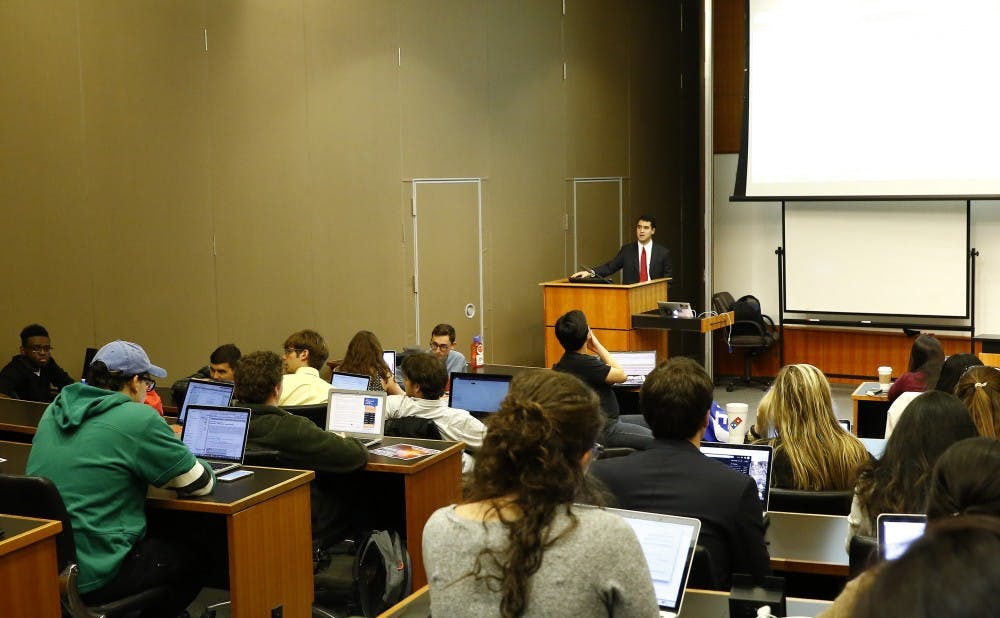The Duke Student Government Senate does not proportionately represent Duke’s race, gender and socioeconomic demographics, according to an in-house survey.
Junior Ilana Weisman, vice president of equity and outreach, presented results of a DSG demographic survey conducted during the past two weeks to the Senate Wednesday. Fifty-eight senators, 12 executive board members, three cabinet members, three members of the DSG Judiciary, two Fix My Campus members and two Gatekeepers participated in the survey. The Senate also debated decreasing the size of the Senate and approved a referendum to give themselves the power to do so. Some senators raised concerns, however, that doing so would deprive the student body of voting power.
The survey found that the average family income of DSG members is at least $134,690, that 64 percent of DSG identifies as male and that approximately two-thirds of DSG is white. Approximately half of Duke’s student body is white and approximately half is male, according to the data Weisman presented as part of the survey results.
Five percent of DSG is black/African-American, the survey noted, compared to 11 percent of the entire university population.
The survey also found that DSG does not proportionally represent Pratt and international students. The University is 15 percent international students, but DSG is only five percent international students. Fifty-six percent of DSG is involved in Greek life, compared to about 34 percent of the entire Duke student body.
DSG proportionally represents first-generation college students and the breakdown of Trinity majors, and is also mostly representative of the University’s gender identity distribution. About one-third of DSG is on need-based financial aid, compared to around 55 percent of Duke students who receive such aid.
“I think the biggest thing we can do is to reach out to student groups and we need to toe the line of potentially tokenizing students of color, queer students, international students, to try to make DSG more representative of the student body,” Weisman said.
DSG also discussed changes to senate bylaws and constitutional revisions that would decrease the number of senate seats. A major concern was whether decreasing the size of the Senate would actually improve efficiency.
After lengthy debate, during which senators proposed many different ideas on how to effectively decrease the size of the Senate, senators favored a plan proposed by junior Tanner Lockhead, vice president of Durham and regional affairs. Lockhead’s plan would eliminate Senate seats that no one runs for in a given election.
During these deliberations, there was a failed attempt to deprive the Senate of quorum by having senators leave, so the Senate would not have to decide on the proposed changes this meeting.
They approved to referendum on whether to give the Senate the power to change the number of Senate seats without having the student body approve the change through referendum in the future. This referendum will be put on the ballot on Tuesday.
Junior Tara Bansal, vice president of academic affairs, proposed to repeal the Senate’s decision to approve the referendum. Without having unanimous consent, her proposal failed. Senior Jay Sullivan, senator for equity and outreach, voiced concern that the vote would deprive students of their ability to vote for elected representatives.
“What we’re voting on tonight is purely for me an ethical decision about the role DSG should play in the student body and the oversight that students have over their government body which governs all of the finances for student organizations at Duke,” Sullivan said. “It’s unethical, and I think it shows our irresponsibility for our students and their concerns with how we manage our money, how we deal with student organizations and how we represent them to the administration.”
Freshman Jackson Dellinger, senator for Durham and regional affairs, noted, however, that reducing the size of the Senate could help combat perceptions of DSG being “wasteful.”
In other business:
President Keizra Mecklai, a senior, announced that there is an implicit goal to spend $100,000 of surplus this year. A committee started by senior Brian Hopkins, senator of academic affairs, has been exploring ways to spend the surplus.
SOFC chair candidates Gwen Geng, a sophomore, and Alexa Soren, a junior, presented their platforms for candidacy.
Senior Wills Rooney presented on behalf of the Catholic Center to get funding for an event that was previously denied funding by both the Student Organizing Finance Committee and the Funding Oversight and Appeals Committee. The Senate was unable to vote on this because of the time spent on the proposed bylaw and constitutional changes.
Senators unanimously passed a resolution, to oppose recent changes in North Carolina voting law that made it more difficult for Duke students to vote.
Class of 2019
Editor-in-chief 2017-18,
Local and national news department head 2016-17
Born in Hyderabad, India, Likhitha Butchireddygari moved to Baltimore at a young age. She is pursuing a Program II major entitled "Digital Democracy and Data" about the future of the American democracy.

